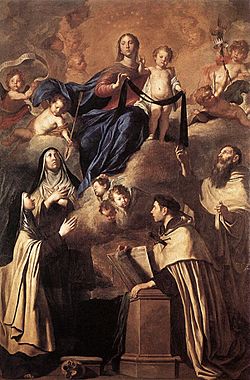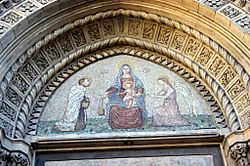Simon Stock facts for kids
Quick facts for kids SaintSimon Stock O.Carm |
|
|---|---|

Pietro Novelli, Our Lady of Mount Carmel and Carmelite Saints (Simon Stock (standing), Angelus of Jerusalem (kneeling), Mary Magdalene de'Pazzi, Teresa of Avila), 1641 (Museo Diocesano, Palermo.).
|
|
| Visionary and Mystic | |
| Born | c. 1165 possibly Aylesford England |
| Died | 16 May 1265 Bordeaux, France |
| Venerated in | Roman Catholic Church |
| Major shrine | Aylesford, England |
| Feast | May 16 |
| Attributes | Carmelite friar holding a scapular |
| Patronage | Bordeaux, France |
Simon Stock was an English Catholic priest and saint who lived in the 1200s. He was an early leader, called a prior, of the Carmelite religious order. People traditionally believe that the Blessed Virgin Mary appeared to him. She is said to have given him the Carmelite habit, which includes the Brown Scapular. Because of this, many people who honor Simon Stock also show devotion to Our Lady of Mount Carmel.
Contents
The Life of Saint Simon Stock
The Carmelite religious order started in Palestine as a group of Christian hermits. Hermits are people who live alone, often for religious reasons. In the early 1200s, when Muslim rule returned to Palestine, the Carmelites moved to Europe. There, they became mendicant friars, which means they lived by begging and serving others.
Simon Stock was born in England. He became an important leader of the Carmelite Order soon after it arrived in England.
Early Life and Miracles
What we know about Simon's life comes from old lists of saints and Carmelite leaders. These old writings sometimes have different details. The earliest ones say Simon was known for being very holy during his life. After he died, miracles were said to have happened because of him.
The name "Stock" might come from a story that Simon lived in a hollow tree trunk before the Carmelites came to England. This was seen as following an old tradition.
Spreading the Carmelite Order
Simon Stock is believed to have lived in Aylesford in Kent, England. In 1247, the first major meeting of the Carmelite Order outside the Holy Land happened there. Today, there is still a Carmelite monastery in Aylesford.
Simon was likely the fifth or sixth leader of the Carmelites, serving from about 1256 to 1266. During his time, the order grew a lot in southern and western Europe, especially in England. Simon is known for starting Carmelite houses in important university cities. These included Cambridge in 1248, Oxford in 1253, Paris in 1260, and Bologna. This helped the order grow and train its younger members.
Simon Stock lived a very simple and strict life. He ate only herbs, roots, and wild apples, and drank only water. He is said to have died in Bordeaux, France, on May 16. His exact death year is not known. He was buried in Bordeaux.
Honoring Saint Simon Stock
The first special prayers and songs for Simon Stock were written in Bordeaux in 1435. People started celebrating his feast day in Ireland and England in 1458. By 1564, it was celebrated throughout the Carmelite Order. His feast day is May 16.
Simon's bones are still kept in a cathedral in Bordeaux. In the 1860s, a part of his leg bone was brought to England. It is now in the Carmelite church in Kensington, London. A piece of his skull was placed in a shrine at Aylesford in 1950. Simon Stock is the special protector, or patron saint, of the English branch of the Discalced Carmelites.
The Brown Scapular and Its Meaning
The Brown Scapular is a special piece of cloth worn by many Catholics. It is a sign of their connection to the Carmelite Order and their devotion to the Virgin Mary.
The Scapular Promise
Carmelite tradition says that in 1251, the Virgin Mary appeared to Simon Stock. She gave him the Scapular of Our Lady of Mount Carmel and made a special promise. This promise was: "whoever dies clothed in this habit shall not suffer the fires of Hell." This means that anyone who stays faithful to their Carmelite calling until death will receive God's grace to be saved.
At first, this promise was for Carmelite religious members. But starting in the 1500s, Carmelites began giving the Brown Scapular to everyday people. It became a very popular religious item.
Understanding the Scapular Today
For a long time, the Church has approved the devotion to the Brown Scapular. This means it is a good and helpful practice for Catholics. Wearing the scapular is seen as a sign of a person's commitment to Mary. It is also a promise of her protection.
Some historians have studied old documents and wondered if the vision of Mary giving the scapular actually happened exactly as the story says. They suggest the story might have developed later. It could be a way to show the strong Carmelite belief in Mary's favor and protection. Many other religious orders in the Middle Ages had similar stories about Mary giving them their special clothing or promising protection.
Even with these historical questions, the Catholic Church still strongly recommends devotion to the Brown Scapular. The Carmelites continue to find deep meaning in the traditional story of Simon Stock receiving the scapular. They see it as a symbol of their loving relationship with Mary.
In 2001, Pope John Paul II spoke to the Carmelite family. He said that the devotion to the Holy Scapular has become a "treasure for the whole Church." He noted that because it is simple and meaningful, this devotion was widely accepted by God's people. It is even celebrated on July 16, the Feast of Our Lady of Mount Carmel, in the Church's calendar.
See also
 In Spanish: Simón Stock para niños
In Spanish: Simón Stock para niños
- Scapular of Our Lady of Mount Carmel
- Carmelites
- Our Lady of Mount Carmel
- Hermit
- St Simon Stock Catholic School
 | James Van Der Zee |
 | Alma Thomas |
 | Ellis Wilson |
 | Margaret Taylor-Burroughs |


